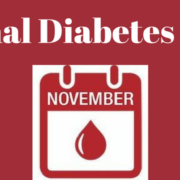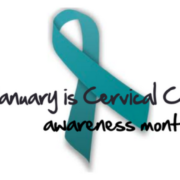Defeat Diabetes!
With Thanksgiving approaching, it may seem like a joyous occasion for most, but for a segment of the population, it may be another day of battling your urges, for the sake of long-term health. November is recognized as American Diabetes Month; and with diabetes affecting nearly 30 million people and their families, it’s important to remind them that they are not alone, and to share information to those who are newly diagnosed.
For a quick summary of the condition, we turn to the Mayo Clinic. Diabetes affects how your body uses glucose. Glucose, or blood sugar, is a major source of energy for the cells in your muscles, tissues, and your brain. However, too much glucose in your blood can cause major health risks such as:
- Cardiovascular Disease
- Nerve, Kidney, Foot, and/or Eye Damage
- Hearing Impairment
- Skin infections
- Alzheimer’s
Since there are different types of diabetes (Type 1 and Type 2) there are different risk factors associated with each, and we’ll share a few below:
- Type 1 Diabetes – more prevalent during childhood/adolescence – removes insulin production from the body.
- Risk Factors
- Family History
- Dietary Factors
- Environment Factors
- Geography
- Risk Factors
- Type 2 Diabetes – more prevalent during adulthood – body becomes insulin resistant.
- Risk Factors
- Family History
- Age/Weight/Race
- Inactivity
- High Blood Pressure
- Abnormal Cholesterol levels
- Risk Factors
Consequently, knowing these risk factors, what should you do if you’re diagnosed? Binge eating will certainly not be the answer, however, Diabetic Living shared a few tips on how to approach a new diagnosis.
- Inspect your health plan – find the best and most affordable health plan that will cover your upcoming medications and supplies.
- Consider medications to lower your blood sugar – It’s now recommended to take at least one glucose-lowering medication as soon as you’re diagnosed (e.g. metformin).
- Create a diabetes eating plan – Monitor what you eat, but also track it to see its impact on your blood glucose levels. Most times you don’t have to make drastic changes.
- Create a physical activity plan – Just like your diet, physical activities are important when diabetic. Food provides the energy, and the activity helps burn some of it. Incorporating this into an everyday routine can have great impact.
- Shop for Diabetes supplies – Blood glucose meters, test strips, and a blood glucose journal are just a few things that can help you along the way.
- Connect with others – As we mentioned earlier, you’re not alone in this fight. Connecting with others can relieve you of any anxieties and motivate you to take care of yourself.
- Choose your primary care provider
Now if you’re not a diabetes rookie, you’d be more focused on how to manage your diabetes. With help from the National Institutes of Health (NIH), they shared 4 major actions you should take to manage your diabetes throughout your lifetime.
- Learn More about Diabetes
- Get a better understanding about the type of diabetes you have and ones you’re not sure of (e.g. Gestational diabetes).
- Take classes, join support groups, and talk to your doctors (i.e. dentist, dietician, eye doctor) in your health team to see how it can affect other areas
- Know your diabetes ABCs
- A – A1C test. It measures your sugar levels over a 3-month span
- B – Blood pressure. Have blood pressure goals and know what gets it too high or too low
- C – Cholesterol. Like blood pressure, have cholesterol goals and ask your doctor what those numbers should be
- Learn to live with diabetes
- Ask for help, discover new hobbies, voice your concerns to your support system
- Spend time developing a food palette and compare your sugar levels to see what part of your diet needs changing
- Get routine care
- Getting routine care at least twice a year can help catch any future problems, early
- Get the A1C test twice
- Ask your primary care doctor and other members in your health team if any other tests are required
If you’re already an R-Health Member, you’ve already got a great primary care doctor. Your R-Health doctor can spend the time with you to create your own health plan, covering what to eat, medication suggestions, and how to balance physical activity. A strong relationship with your primary can help you overcome some of the obstacles associated with diabetes, including a loaded Thanksgiving plate.













Leave a Reply
Want to join the discussion?Feel free to contribute!